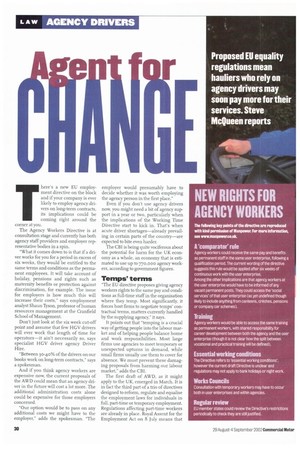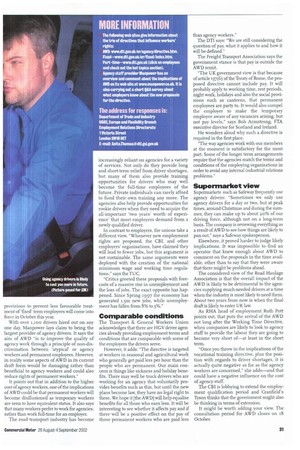T here's a new EU employment directive on the block and
Page 30

Page 31

If you've noticed an error in this article please click here to report it so we can fix it.
if your company is ever likely to employ agency drivers on long-term contracts, its implications could be coming right around the corner at you.
The Agency Workers Directive is at consultation stage and currently has both agency staff providers and employer representative bodies in a spin.
"What it comes down to is that if a driver works for you for a period in excess of six weeks, they would be entitled to the same terms and conditions as the permanent employees. It will take account of holiday, pensions and rights such as maternity benefits or protection against discrimination, for example. The issue for employers is how much this will increase their costs," says employment analyst Shaun Tyson, professor of human resources management at the Cranfield School of Management.
Don't just look at the six week cut-off point and assume that few HGV drivers will ever work that length of time for operators—it ain't necessarily so, says specialist HGV driver agency Driver Hire.
"Between 30-40% of the drivers on our books work on long-term contracts," says a spokesman.
And if you think agency workers are expensive now, the current proposals of the AWD could mean that an agency driver in the future will cost a lot more. The additional administration costs alone could be expensive for those employers concerned.
"Our option would be to pass on any additional costs we might have to the employer," adds the spokesman. "The employer would presumably have to decide whether it was worth employing the agency person in the first place."
Even if you don't use agency drivers now, you might need a bit of agency support in a year or two, particularly when the implications of the Working Time Directive start to kick in. That's when acute driver shortages—already prevailing in certain parts of the country—are expected to bite even harder.
The CBI is being quite vociferous about the potential for harm for the UK economy as a whole, an economy that is estimated to use up to 77o.000 agency workers, according to government figures.
Temps' terms
'The Eli directive proposes giving agency workers rights to the same pay and conditions as full-time staff in the organisation where they temp. Most significantly, it forces host firms to negotiate temps' contractual terms, matters currently handled by the supplying agency," it says.
It points out that "temping is a crucial way of getting people into the labour market and of helping people balance home and work responsibilities. Most large firms use agencies to meet temporary or unexpected upturns in demand, while small firms usually use them to cover for absence. We must prevent these damaging proposals from harming our labour market," adds the CBI.
The first draft of AWD, as it might apply to the UK, emerged in March. It is in fact the third part of a trio of directives designed to reform, regulate and equalise the employment laws for individuals in full, part-time or temporary employment. Regulations affecting part-time workers are already in place. Royal Assent for the Employment Act on 8 July means that provisions to prevent less favourable treatment of 'fixed' term employees will come into force in October this year.
With over Lioo drivers hired out on any one day. Manpower lays claim to being the largest provider of agency drivers. It says the aim of AWD "is to improve the quality of agency work through a principle of non-discrimination between 'atypical' or agency workers and permanent employees. However, in reality some aspects of AWD in its current draft form would be damaging rather than beneficial to agency workers and could also reduce rights of permanent workers."
It points out that in addition to the higher cost of agency workers, one of the implications of AWD could be that permanent workers will become disillusioned as temporary workers are seen to have equivalent status. It also says that many workers prefer to work for agencies, rather than work full-time for an employer.
The road transport industry has become increasingly reliant on agencies for a variety of services. Not only do they provide long and short-term relief from driver shortages, but many of them also provide training opportunities for drivers who may well become the full-time employees of the future. Private individuals can rarely afford to fund their own training any more The agencies also help provide opportunities for rookie drivers when they need to acquire the all-important 'two years' worth of experience' that most employers demand from a newly qualified driver.
In contrast to employers, the unions take a different view. "Whenever new employment rights are proposed, the CBI, and other employers' organisations, have claimed they will lead to fewer jobs, but this argument is not sustainable. The same arguments were deployed with the creation of the national minimum wage and working time regulations," says the TUC.
"Critics greeted these proposals with forecasts of a massive rise in unemployment and the loss of jobs. The exact opposite has happened. Since Spring 19 97 the economy has generated 1.5in new jobs, while unemployment has fallen from 8% to 5%."
Comparable conditions
The Transport & General Workers Union acknowledges that there are HGV driver agencies already providing employment terms and conditions that are comparable with some of the employers the drivers serve.
However, it adds: "The directive is targeted at workers in seasonal and agricultural work who generally get paid less per hour than the people who are permanent. Our main concern is things like sickness and holiday benefits. There may well be truck drivers who are working for an agency that voluntarily provides benefits such as this, but until the new plans become law, they have no legal right to these. We hope it [the AWD] will help equalise benefits for all those who earn less. It will be interesting to see whether it affects pay and if there will be a positive effect on the pay of those permanent workers who are paid less
The DTI says: "We are still considering the question of pay, what it applies to and how it will be defined."
The Freight Transport Association says the government stance is that pay is outside the AWD remit.
"The UK government view is that because of article 137(6) of the Treaty of Rome, the proposed directive cannot include pay. It will probably apply to working time, rest periods, night work, holidays and also the social provisions such as canteens, that permanent employees are party to. It would also compel the employer to make the temporary employee aware of any vacancies arising, but not pay levels," says Bob Armstrong, FTA executive director for Scotland and Ireland.
He wonders aloud why such a directive is required in the first place.
"The way agencies work with our members at the moment is satisfactory for the most part. Some of the longer term arrangements require that the agencies match the terms and conditions of the employing organisations in order to avoid any internal industrial relations problems."
Supermarket view
Supermarkets such as Safeway frequently use agency drivers: "Sometimes we only use agency drivers for a day or two, but at peak times, around Christmas and during the summer, they can make up to about 20% of our driving force, although not on a long-term basis. The company is reviewing everything as a result of AWD to see how things are likely to pan out," says a Safeway spokesperson.
Elsewhere, it proved harder to judge likely implications. It was impossible to find an operator that knew enough about AWD to comment on the proposals in the time available, other than to say that they were aware that there might be problems ahead.
The considered view of the Road Haulage Association is that the overall impact of the AWD is likely to be detrimental to the agencies supplying much-needed drivers at a time when the industry is most likely to need them. About two years from now is when the final draft is likely to enter UK law.
As RHA head of employment Ruth Port points out, that puts the arrival of the AWD not long after the Working Time Directive, when companies are likely to look to agency staff to provide the labour they are going to become very short of—at least in the short term.
"Once you throw in the implications of the vocational training directive, plus the position with regards to driver shortages, it is actually quite negative as far as the agency workers are concerned," she adds—and that could have a negative influence on the cost of agency staff The CBI is lobbying to extend the employment qualification period and Cranfield's Tyson thinks that the government might also be thinking in terms of extension.
It might be worth adding your view. The consultation period for AWD closes on r8 October.
















































































































































